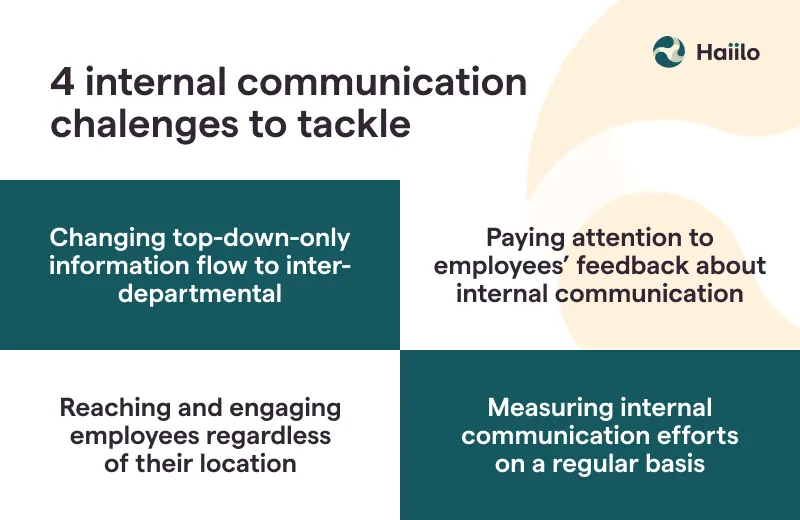Internal marketing is just as important as external marketing when it comes to motivating and engaging employees into the company and their work.
Don’t forget to market your company’s mission and vision to your most important allies – your employees.
Internal marketing, when done right, ensures that your employees are providing high-quality service to your customers and helping the company grow and prosper. One of the key component of internal marketing is have an effective internal communication in place.
In internal marketing, employees are treated as “internal customers” who need to know the company’s vision inside out and communicate that to the outside world.
Not only should you embrace internal marketing to ensure a better communication flow and align employees with the company’s mission, you should invest in it to make sure your employees are conveying your company message to their networks in the best possible way.
What Is Internal Marketing?
In a nutshell, internal marketing is the promotion of a company’s vision, goals, culture, and mission statement within the organization.
The idea behind internal marketing is to earn employees’ enthusiasm by creating an emotional connection to the brand.
Internal marketing involves marketing tactics to earn employees’ enthusiasm about the brand.

Employees that believe in the brand are more likely to be more motivated, increase their productivity, communicate their enthusiasm to the clients and to become brand ambassadors on social media.
Internal marketing has a tremendous impact on employee engagement and retention.
The Key Components of Internal Marketing
Internal marketing includes key components such as:
- A clear strategy with specific goals
- Effective internal communication
- Great onboarding experience
- Education on the company’s products and services
- Trust and transparent communication
- A great employee experience
- A positive workplace culture
- Professional development opportunities
- Effective cross-departmental collaboration and teamwork
Leverage technology to efficiently do internal marketing
Haiilo helps you get your internal messages out quicker
The Role of Internal Communication in Internal Marketing
When it comes to internal marketing, internal communication is the key.
The way you communicate with your employees has a great impact on their enthusiasm about the brand and employee engagement overall.
Before you get started with your internal marketing strategy, you may want to rethink your internal communication.
Keep in mind that the main internal communication challenges that most businesses face include:
- Changing top-down communication to inter-departmental communication
- Changing the strategy in place based on employees’ feedback
- Reaching and engaging with all employees
- Measuring the performance of internal communication

5 Ways Internal Marketing Boosts Employee Engagement
1. Internal Marketing Boosts Alignment with Company Goals
Internal marketing bridges the gap between promise makers (marketers) and promise keepers (employees).
When employees are informed and engaged with the brand guideline and overall goals, they will also support branding on every level.
This can take place in the form of providing access to relevant content or facilitating other ways of knowledge sharing in the company.
Internal marketing is about building a consistent company story and aligning your HR, leadership, management, and corporate communications teams around the same narrative. When employees buy in, customers buy more.
💡 Learn about how to align employees with your business strategic goals.
2. Internal Marketing Builds a Connection Between the People and What They Sell
As explained earlier, internal marketing is a way to build an emotional connection with the product or service employees sell, which matters a great deal in terms of how engaged they are with their work.
If everyone within the company is motivated to sell/market/develop the product they work with, business will likewise be positively impacted.
Consider, for example, telling stories about how your business was formed and what are some of the key lessons learned along the way.
Related: Sara McGuire on Why Visual Storytelling Drives Higher Engagement
3. Internal Marketing Builds Trust In the Workplace
Marketing a shared vision and reducing silos will make employees feel trusted and more confident in their work.
According to the Edelman “Trust Barometer” (a survey of 33,000 people in 28 countries), one in three people doesn’t trust their employer.

In the same Edelman research, it was also discovered that trust decreases from top positions to the lowest. For instance, 64% of executives trust their organizations, while only 51% of managers and 48% of other staff trust their organizations.
Also, with internal marketing you can boost knowledge sharing and avoid information silos, which are harmful for prioritizing work, motivation and the ability to see the bigger picture.
When information is not shared, it also acts as a signal to them that they are not allowed to contribute. Start by outlining or revisiting your internal communication strategy and then consider how you can use technology to weave internal marketing to your employees.
📚Check out our article on Top Communication Barriers and learn how to master the art of communication.
4. Internal Marketing Boosts Employee Advocacy
Internal marketing can also turn your employees active brand advocates. As customers increasingly tune to social media to understand what brands and businesses are doing, the voice of the employee has value.
According to Hinge Research: “A formal employee advocacy program helps shorten the sales cycle. Nearly 64% of advocates in a formal program credited employee advocacy with attracting and developing new business, and nearly 45% attribute new revenue streams to employee advocacy.”

Internal marketing can use stories to connect your workforce with your corporate vision and values. It produces shareable content that expands and nurtures the employees’ own networks and online communication channels, maximizing your company outreach.
Internal Marketing in a Nutshell
Keep in mind the overall mission that you want to communicate and what the employees’ roles are in making it happen.
Approach internal marketing as a way to inform employees, engage them closer to the company and make sure they can sell the company vision to customers, as well.
Make sure to socialize and spread the effort – all departments have a stake in the matter.









